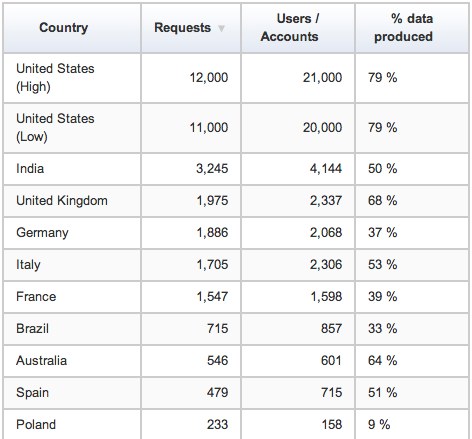
Countries that made the most data requests of Facebook in the fist half of 2013.
Finally catching up with competitors such as Google who have issued transparency reports for several years,
Facebook on Tuesday released its first-ever “Global Government Requests Report” detailing the number of times officials in various countries sought data about users and accounts.
The report covers the first half of 2013 and says the U.S. made between 11,000 and 12,000 requests involving between 20,000 and 21,000 users or accounts. Facebook complied with 79% of those requests. The range for the U.S. vs. a specific number for other countries is believed to be because of U.S. requirements that requests involving national security can only be released in ranges. Facebook and several of its rivals are urging the government to allow specific numbers be released instead of ranges.
“We continue to push the United States government to allow more transparency regarding these requests, including specific numbers and types of national security-related requests. We will publish updated information for the United States as soon as we obtain legal authorization to do so,” Facebook General Counsel Colin Stretch said in releasing the data.
Facebook’s data seems to indicate a significant drop-off in the number of users or accounts from the second half of 2012. In first-ever data it released after the PRISM program details were first leaked by Edward Snowden earlier this year, it said it had received 9,000-10,000 requests involving 18,000-19,00 users or accounts between July 1 and Dec. 31, 2012. (See a table that summarizes data reports from a variety of companies).
Globally, Facebook said it has up to 26,607 requests involving 38,954 users in about 70 countries. The average compliance rate was 33%. India (3,245 requests and 4,144 users/accounts) and the United Kingdom (3,245/4,144) were No. 2 and No. 3 behind the U.S.
“The vast majority of these requests relate to criminal cases, such as robberies or kidnappings,” Facebook’s Stretch said. “In many of these cases, these government requests seek basic subscriber information, such as name and length of service. Other requests may also seek IP address logs or actual account content. We have strict guidelines in place to deal with all government data requests.”
Facebook’s compliance rate is higher than Twitter’s (it reported 67% a few weeks ago) and is about the same as Microsoft, which reported about 80% for 2012, and is lower than Google’s most recently reported 88%, which itself was down from 94%.
→ Earlier stories on transparency reports.
ON THE JUMP: A sortable chart with all the Facebook data.
Continue reading →






